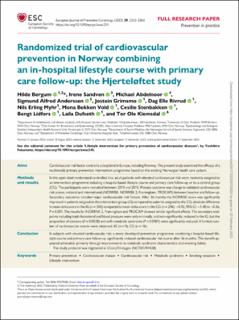Randomized trial of cardiovascular prevention in Norway combining an in-hospital lifestyle course with primary care follow-up: The Hjerteløftet study
Bergum, Hilde Marie; Sandven, Irene; Abdelnoor, Michael; Anderssen, Sigmund Alfred; Grimsmo, Jostein; Rivrud, Dag Elle; Myhr, Nils Erling; Vold, Mona Bekken; Stenbakken, Cesilie Meling; Lidfors, Bengt; Dufseth, Laila; Klemsdal, Tor Ole
Peer reviewed, Journal article
Published version
Permanent lenke
https://hdl.handle.net/11250/3055446Utgivelsesdato
2022Metadata
Vis full innførselSamlinger
- Artikler / Articles [2119]
- Publikasjoner fra Cristin [1107]
Originalversjon
European Journal of Preventive Cardiology. 2022, 29(17), Side 2252-2263. 10.1093/eurjpc/zwac211Sammendrag
Aims: Cardiovascular risk factor control is suboptimal in Europe, including Norway. The present study examined the efficacy of a multimodal primary prevention intervention programme based on the existing Norwegian health care system.
Methods and results: In this open-label randomized controlled trial, adult patients with elevated cardiovascular risk were randomly assigned to an intervention programme including a hospital-based lifestyle course and primary care follow-up or to a control group (CG). The participants were recruited between 2011 and 2015. Primary outcome was change in validated cardiovascular risk scores, national and international (NORRISK, NORRISK 2, Framingham, PROCAM) between baseline and follow-up. Secondary outcomes included major cardiovascular risk factors. After 36 months the NORRISK score was significantly improved in patients assigned to the intervention group (IG) compared to patients assigned to the CG; absolute difference in mean delta score in the IG (n = 305) compared to mean delta score in the CG (n = 296): −0.92, 95% CI: −1.48 to −0.36, P = 0.001. The results for NORRISK 2, Framingham and PROCAM showed similar significant effects. The secondary endpoints including total cholesterol and blood pressure were only minimally, and non-significantly, reduced in the IG, but the proportion of smokers (P = 0.0028) and with metabolic syndrome (P < 0.0001) were significantly reduced. A limited number of cardiovascular events were observed, IG (n = 9), CG (n = 16).
Conclusion: In subjects with elevated cardiovascular risk, a newly developed prevention programme, combining a hospital-based lifestyle course and primary care follow-up, significantly reduced cardiovascular risk scores after 36 months. This benefit appeared achievable primarily through improvements in metabolic syndrome characteristics and smoking habits.
Beskrivelse
This is an Open Access article distributed under the terms of the Creative Commons Attribution-NonCommercial License (https://creativecommons.org/licenses/by-nc/4.0/), which permits non-commercial re-use, distribution, and reproduction in any medium, provided the original work is properly cited.
